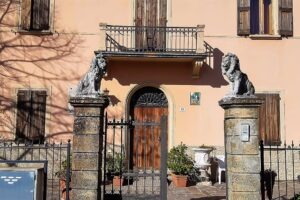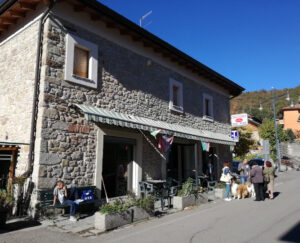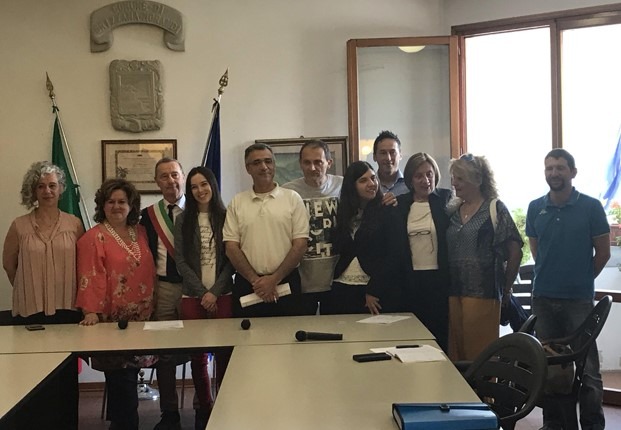
Giorgio has started a WhatsApp group: Borgo Casigno. I read his first message in disbelief. This Saturday morning, there will be a consiglio, a meeting, with the mayor about the fognatura — the drainage system — in our borgo. Giorgio calls on everyone to attend, to show just how important this is to us. “The more people, the better!”
How has he managed this so quickly? Is Giorgio more important than I imagined? A friend of the mayor? A generous donor? Has he got serious leverage on our burgomaster? And what exactly does a consiglio entail? Does the mayor always work on Saturday mornings? In my Dutch naivety, I ask an overly Dutch question: “What’s on the agenda?”
Discussions in these kinds of groups are chaotic at best. Italian verbosity adds an extra layer of complexity. After 48 messages — most of them responses to other messages, though without any indication of what or whom they’re responding to — I give up. The idea of first meeting amongst ourselves to draft an agenda and key discussion points seems too logical to bring up. I settle for a simple: “I’ll be there.”
Annarita is delighted with the bottle of homemade Nocino — walnut liqueur — I bring her. She pours coffee, serves fresh crostata (plum tart), and because she’s not in the Borgo Casigno app, I fill her in on all the drama. I even read out some of the messages.
“Is there something I don’t know about Giorgio?” I ask carefully. “And about the mayor? Does he always work on Saturdays?”
She places another slice of tart on my plate and settles in comfortably. No, as far as she knows, Giorgio is just Giorgio. His grandparents were from around here, so he probably knows people who know people. And of course, the mayor doesn’t normally work on Saturdays — except for ribbon-cuttings and commemorations.
“So he actually thinks this is important?” Annarita doesn’t laugh out loud — that would be un-Italian — but the sparkle in her eyes says enough.
“Caro, sweetheart, in six months there are elections. Next week, he’s announcing that he’s ‘available’ for a second term. He at least has to pretend to care. Siamo in Italia.”
Turns out consiglio is better translated as “gathering” than “meeting.” The turnout is decent — about fifteen of us. Even the owners of second homes have decided they don’t want to miss this. The mayor clearly wasn’t expecting this many people, so we relocate to the municipal council’s meeting room.
Once we’re all seated, the sindaco delivers a warm and engaged ten-minute welcome speech, then leans back. He’s here to listen.
To my surprise, it’s Diana, Marco’s wife, who takes the lead. She has clearly decided to highlight their sinking garden due to the failing fognatura right away. The mayor nods and makes a note — just one word, by the looks of it.
Then, our neighbours start interrupting each other. One wants to talk about the smell, another about the Hera water company and low water pressure, Giorgio jumps in with his broken fossa, which according to him should have precedence. Alas he stands alone. The mayor nods again. He has now written down three words.
After an hour, he checks his watch. Unfortunately, he has another appointment. He thanks everyone for coming and for sharing their concerns. The engagement and spirit of civic duty displayed today are, of course, heartwarming. Naturally, he can’t make any immediate promises — this issue is simply too complex. But let there be no doubt that this problem, which affects many borgos, has his full attention. He will discuss our situation with the Ufficio Tecnico (Technical Office), with Hera, and with the Unione Comuni Appennino Bolognese (the coalition of local municipalities). He proposes a sopralluogo—an on-site inspection—with one of their specialists as soon as possible. He will let us know when that can happen.
The after-meeting is held in the local bar/pizzeria/tobacconist next to the town hall. Most municipal employees have their pranzo – their lunch – here, and judging by the hushed conversations and quiet negotiations, this might just be where the real decisions are made. It’s already lively when about ten of us walk in. Over a frizzantino, a small glass of sparkling Pignoletto, everyone expresses their satisfaction. This was a good, productive gathering.
That afternoon, I give Annarita a full report. When she hears about the sopralluogo, she asks just one question: “Together with il responsabile, the head of the Technical Office?”
I nod. She, with the wisdom of years, slowly shakes her head.
“Siamo in montagna, caro, siamo in montagna.” We are in the mountains, dear.
We are in the mountains.
To be continued?

